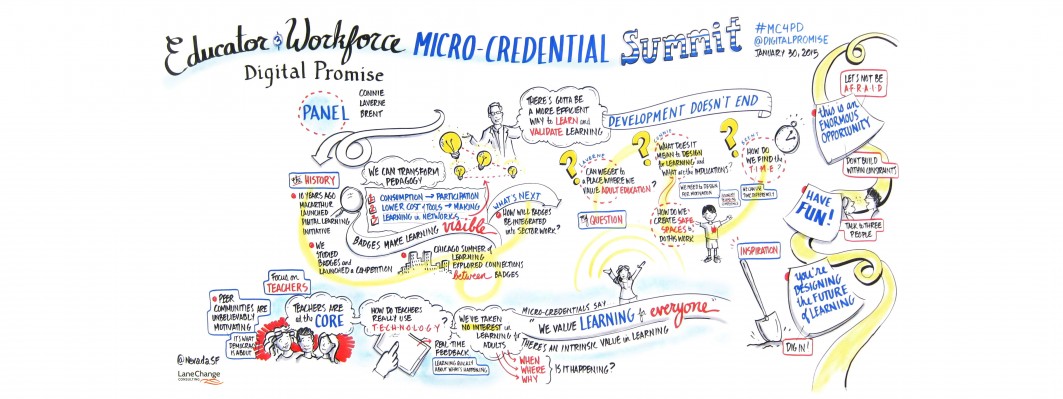
Many sectors, including education, acknowledge that learning does not end when formal training does. In particular, key innovations of the last two decades have opened new possibilities for ongoing learning. As a result, where we learn and where we receive credit for that learning are not necessarily the same place. While this affords learners unprecedented freedom, it also can make it difficult to effectively recognize that learning.
Micro-credentials present an opportunity to address this challenge. Specifically, educators can pursue micro-credentials, sharable as digital badges, to gain recognition for competencies they demonstrate throughout their careers, regardless of where it happens. We’re fortunate to be part of a strong ecosystem that supports and recognizes continuous learning for educators. As we dig into this work with researchers, developers, and educators, we’re exploring some key questions guiding our journey.
“To be successful we should be moving from a system that requires adult learning to one that values adult learning,” LaVerne Srinivasan, vice president of education programs at the Carnegie Corporation of New York, said at a recent summit to explore the promise of micro-credentials.
“To be successful we should be moving from a system that requires adult learning to one that values adult learning.” LaVerne Srinivasan
Vice President of Education
Carnegie Corporation of New York
Our current workforce system frequently requires continuous learning in the form of credit hours or continuing education units, and these are typically measured in seat-time. However, these structures do not often effectively value that learning. To fully prioritize lifelong learning for educators, we must rethink not only where learning happens, but how we recognize it.
Micro-credentials can help shift to a competency-based approach to recognizing learning. Competency-based paradigms rely on evidence of authentic mastery as the basis for recognizing learning. The DNA of our micro-credential design reflects this emphasis on evidence.
However, this cannot happen without the right supports and learner buy-in.
Will the growth of MCs be driven from top down or bottom up? Both! Bottom up innovation requires top down support, #MC4PD
— pat deklotz (@PDeklotz) January 30, 2015
“Bottom-up innovation requires top-down support,” said Pat Deklotz, superintendent at Kettle Moraine School District, in Wisconsin.
Concretely, systems in which educators work must provide visible and meaningful recognition for earning these micro-credentials, rewarding and incentivizing a shift from seat-time to competency-based recognition. Although intrinsic rewards are powerful, by providing extrinsic incentives to earn micro-credentials, systems can ensure that the time and energy teachers invest in pursuing micro-credentials translate into concrete, long-term value.
At the same time, educator voice must remain central to micro-credentials at every step.
Peer communities matter. The opportunity to demonstrate before your peers what you have learned is incredibly important says @Connie #MC4PD
— Jen Humke (@jhumke) January 30, 2015
“Peer communities matter,” Connie Yowell, director of education at the MacArthur Foundation, said at our recent summit. “The opportunity to demonstrate before your peers what you have learned is incredibly important.” With a system of micro-credentials that reflects educators’ needs and goals, educators will be empowered to chart their personalized paths of professional learning.
By designing systems that reflect the real needs of educators and supporting those systems with meaningful recognition for learners, we can build a culture that authentically values lifelong professional learning.
To view a large version of the graphic recording, click here.
We welcome you to share your own big questions for micro-credentials using the hashtag #MC4PD on social media, the comments section of this blog, or by writing us here.